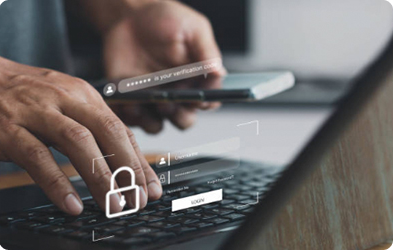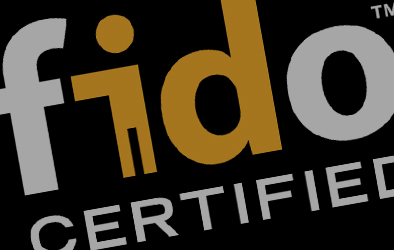Let’s clarify a few myths about MFA
MFA is expensive to implement.
You can find cost-saving opportunities by building upon existing RFID badge infrastructure and using physical access cards for logical access. rf IDEAS® can help you leverage existing software partners, too.
There are many ways to implement a solid MFA rollout without breaking the bank. For example, we enable organizations to utilize their existing infrastructure (ID badges, smartphones and other credentials) to minimize additional investment.
An MFA rollout can be complicated.
Switching to MFA doesn’t mean your IT team must face new obstacles in software or credentials. Single- and dual-frequency WAVE ID® readers support the world’s widest range of credential types, making them less costly and complex to introduce.
We provide both plug-and-play readers and software development kits for custom development. And we have the expertise and partners to assist in your MFA implementation.
Our readers’ flexibility and performance eliminate the guesswork and streamline even the most ambitious MFA rollouts. Some implementations can take as little as days to be up and running.
MFA disrupts productivity.
It’s just the opposite! Passwordless authentication streamlines efficiency for your employees who no longer must enter tedious passwords or PINs multiple times a day—and change them every month or two. Instead, they can focus on their jobs.
A full 50% of IT service desk issues involve password resets, with each reset costing an average of $70.1 MFA keeps your IT team working more efficiently while saving thousands in help desk costs each month.
As MFA becomes more familiar to people in their everyday lives as they use banking or bill payment apps, they become more comfortable with MFA at work. And two-factor authentication—using smartcards and biometric, for example—is actually easier and more secure than using passwords and PINs.
Sources
1. www.infosecurity-magazine.com/webinars/password-management-getting
Only large organizations benefit from MFA.
Small and medium businesses may not pay the millions in fines from a data breach, but this cost is still high relative to their overall budgets. What’s more, nearly 50% of all cyberattacks target SMBs, and these attacks can be far more damaging from a productivity and financial standpoint than they are to large enterprises.2 It’s clear that cybercriminals seek soft targets rather than only large ones.
The good news is that a MFA rollout can be affordable, easy to implement and totally scalable to organizations of any size, in any industry, especially if you can leverage existing door access badges to add logical access control.
Sources
2. https://www.oryxalign.com/blog/the-5-myths-of-multi-factor-authentication/
MFA doesn’t apply to my business.
As a consumer, you see MFA every day when you’re asked for a second factor after entering a password in a banking, credit card or bill payment app. This same prevalence and momentum applies to business as well.
With an introduction of government-backed cybersecurity mandates and an increase in security breaches, nearly three of every four businesses plan to increase spending on MFA, while 49% have labeled MFA as the top security technology to adopt.3
Recent cybersecurity mandates that apply to federal agencies ALSO apply to any company doing business with the federal government. This includes a vast number of private companies of all sizes, in all industries. It pays to make sure your MFA security meets this level of protection.
In addition, a host of global regulations require companies to ensure MFA compliance. These regulations are both general and industry-specific, ranging from HIPAA and EPCS to GDPR, CJIS and more. In fact, MFA will soon be the standard in security compliance across every industry.
Sources
3. https://www.yubico.com/blog/75-of-enterprise-security-managers-plan-to-increase-mfa-spending-according-to-new-study-by-yubico-and-451-research/
Collecting biometric data is an invasion of my privacy.
rf IDEAS® readers do not store biometric data. In addition to GDPR, there are many emerging privacy regulations that protect biometric data. So, authentication methods supported by our readers eliminate the need to store a biometric template, ensuring individual privacy.
In reality, your personal data is far more likely to be compromised when using passwords or PINs versus secure, proven multi-factor authentication.
Our competitors don’t use MFA, so we don’t need it either.
MFA is not an "if" it will happen, but a "when" it will happen. FIDO, an open industry association aimed at helping organizations reduce the world's over-reliance on passwords, has received commitment from Apple, Google, and Microsoft to make the web more secure by expanding support for a common passwordless sign-in, thus increasing its reliance on other factors of authentication.
Sources
4. https://www.apple.com/newsroom/2022/05/apple-google-and-microsoft-commit-to-expanded-support-for-fido-standard/
Gain insights with a MFA Consultation
Create a winning<br>MFA game plan
Related Content

Why Multi-Factor Authentication is Important and How to Implement It
Beyond the government cybersecurity executive order, every commercial enterprise needs to take action for a secure, productive future. Even businesses not directly affected by government-imposed cybersecurity orders are still at risk of cyberattacks. In fact, the danger is considerably higher today than it was just a year ago. As more government-related enterprises reinforce the systems that protect access to their digital infrastructure and data, hackers are turning their attention to commercial enterprises that have failed to recognize and repair the chinks in their armor.
Read More
Cybersecurity for Manufacturers: 4 Ways to Improve Manufacturing Plant Cybersecurity Procedures
Just as banking, insurance, and government leaders were forced to quickly ramp up cyber defenses in the past few years, manufacturing professionals must today make securing their technologies, production lines, facilities, and processes a top priority. As companies expand their connectivity and reliance on cloud computing, major security gaps emerge. And that means the potential for big problems.
Read More
rf IDEAS supports FIDO2 for seamless, passwordless authentication
rf IDEAS, a leading manufacturer of credential readers for authentication and logical access, is pleased to announce that select models of its WAVE ID® Plus, WAVE ID® Nano and WAVE ID® Nano OEM card reader families now support the FIDO2 NFC protocol. This technology brings seamless, passwordless authentication to security-critical enterprises in finance, healthcare, government, manufacturing, education and other markets.
Read More